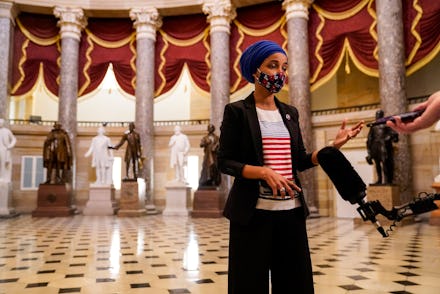Progressive Democrats are pushing Biden to deliver monthly stimulus checks

How long the country wrestles with the economic fallout of the coronavirus pandemic will be directly tied to the actions the government takes right now. Among those actions is a call for a direct cash payment. Americans got their first stimulus check last spring, after Congress passed the $2 trillion CARES Act in March, and a second $600 check tied to the bipartisan relief bill signed in December is still still slowly rolling into people's accounts.
But for many, two one-time cash infusions totaling a measly $1,800 for the most vulnerable populations is hardly enough to deal with a pandemic that's been raging for nearly a year. This week, 54 progressive House Democrats urged President Biden to vastly expand the government's stimulus program, signing on to a letter written by Rep. Ilhan Omar (D-Minn.) that urges the new presidential administration to support recurring direct cash payments.
"Recurring direct payments until the economy recovers will help ensure that people can meet their basic needs, provide racially equitable solutions, and shorten the length of the recession," the letter, which was first published by Business Insider, reads. "As we look at the coming year, another one-time round of checks would provide a temporary lifeline, but when that money runs out, families will once again struggle to pay for basic necessities."
The letter addresses the increasingly dire consequences of the pandemic-related depression, an economic downturn that is directly tied to the lack of action at the highest levels of government for much of last year. Hundreds of thousands of families have been forced out onto the streets, unable to pay rent. Millions of children continue to go hungry. Rates of intimate partner violence and other forms of abuse are up. Death by suicide is also increasing.
Recurring direct cash payments will not immediately solve these crises, but there's evidence that checks have a direct positive impact on impoverishment, which is important given the relationship between economic stress and all other forms of health. "The stunning financial crisis for those at the bottom of the income ladder demands massive relief to those who need it most," the letter reads.
The letter doesn't urge the Biden administration to support a specific dollar amount. It just calls for checks to continue beyond the next stimulus package, and for as long as the pandemic lasts. Shortly after his inauguration, Biden introduced a $1.9 trillion economic recovery package that included one-time direct cash payments of $1,400. That amount comes from the push last year to expand the second stimulus checks from $600 to $2,000; another one-time payment of $1,400, Biden reasons, hits that $2,000 overall goal.
Given the federal government's bungled rollout of checks last year, the letter urges that greater priority be given to those who will "need it the most and spend it the quickest," like the millions of people who have been pushed into economic insecurity in the last year. In addition, the signees argue that payments, which are based on federal tax returns, should also go to older dependents, immigrants, and those who are under- and unbanked, many of whom were previously left out either by design or bureaucratic error.
There's research to support that direct cash payments will directly improve the wellbeing of American families. Two studies published last June found that the predicted poverty rate was stunted because of the CARES Act, without which 12 million people would have become impoverished. The relationship between poverty and checks was so strong that the group of Columbia University researchers concluded: "If high unemployment rates persist beyond July 2020, additional income support will be needed to prevent subsequent increases in economic insecurity and hardship."
Notably, this is not so different from what the House letter says: "One more check is not enough."